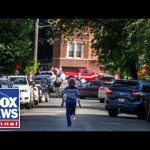The recent events in Minnesota have thrust the issue of school safety into the spotlight, unveiling a tangled web of political decisions, safety concerns, and an apparent bias against religious schools. In light of the heartbreaking tragedy at a Nashville Covenant school, where innocent lives were lost, the Minnesota Catholic Conference reached out to Governor Tim Walz seeking funding. Their request? A hefty $50 million to help bolster the safety of nonpublic schools, including Catholic, Jewish, and Muslim institutions. Unfortunately, this pragmatic plea for assistance fell on deaf ears, as the funds they needed never materialized.
What’s at the heart of this predicament? It appears that an underlying anti-Catholic bias may be at play within the current administration, which many argue has neglected the safety of these independent schools. The Governor’s cozy relationship with teachers’ unions, who have historically opposed independent and parochial schools, raises eyebrows. Publicly funded schools typically benefit from large budgets and resources, while their independent counterparts often operate with a fraction of that. Yet, despite the glaring stats showing higher performance and tighter budgets among nonpublic schools, the funding to secure those institutions remains ungranted.
When a shooter targets a church or school, as seen in Nashville, it raises alarm bells beyond the immediate horror of the tragedy. Experts and commentators agree that such acts should be viewed through the lens of a possible hate crime, especially when directed against particular religious groups. Instead of focusing solely on mental illness or societal issues, it becomes imperative to tackle the anti-religious sentiments seeping into public policy and the culture at large. The alarming number of attacks against churches since 2020 highlights a troubling trend that cannot be ignored.
Despite pledges from Governor Walz’s office that he cares deeply about student safety, his actions tell a different story. The promise of federal funding for school safety appears to ring hollow when key requests from religious institutions are overlooked. While there was an opportunity to pass a bill that would allocate funds specifically for safety measures in schools—an idea propelled by concerned bishops—the call for a special session to address this need was resolutely denied. Families are understandably frustrated, as they consider their children’s safety in an environment that seems indifferent to their requests for protection.
As this issue continues to unfold, it opens the door for broader conversations about parental responsibility and the societal support for mental health. In light of the shooting and the strained familial relationships within these discussions, the reality is that parents worry over potential legal implications for their children. The call to adequately address psychological and sociological issues looms large. The tragic outcomes in this narrative are not simply the result of an individual’s actions; they’re symptomatic of deeper societal failures that need urgent attention.
In the end, the safety of all students, regardless of the faith they follow, should be non-negotiable. With so much at stake, the push for comprehensive support for nonpublic schools and a greater understanding of the challenges they face must take precedence. The question remains: will lawmakers listen and act, or will the needs of these communities continue to be overshadowed by political maneuvering? Time will tell, but for many families, the future of their children’s safety hangs in the balance.




